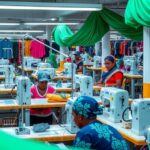Economy
Politics
ANWAR HOSSAIN, ASIA, BANGLADESH, BANGLADESH GARMENT MANUFACTURERS AND EXPORTERS ASSOCIATION, BASH, BASHIRUDDIN, CHINA, DHAKA, DONALD TRUMP, ECONOMY, FOREIGN INVESTMENT, INFLATION, KHALILUR RAHMAN, MEXICO, MUHAMMAD YUNUS, NATIONAL BOARD OF REVENUE, NORTH AMERICA, RA, RAHMAN, RAKIBUL ALAM CHOWDHURY, RDM GROUP, SHEIKH BASHIRUDDIN, STATE DEPARTMENT, TOMMY HILFIGER, TRADE, TRADE DEFICIT, UNITED STATES, US, YUN, YUNUS
Clara Montgomery
Bangladesh’s Emergency Response to New U.S. Tariffs on Garments
Bangladesh’s interim leader held an emergency meeting to address the impact of new U.S. tariffs on its textile industry, which constitutes a significant portion of its exports. With tariffs increasing from 16 percent to 37 percent, leaders in the industry have labeled it a serious threat. The government is preparing for the impacts and has already begun discussions with U.S. officials.
Bangladesh’s interim leader convened an emergency meeting on April 5 to address significant concerns regarding new U.S. tariffs imposed on the nation’s textile industry. Leaders from the garment sector described these tariffs as a “massive blow” to the industry, which constitutes approximately 80 percent of Bangladesh’s export economy. The garment sector is undergoing recovery following disruptions caused by recent political changes in the country.
U.S. President Donald Trump recently implemented tariffs of 37 percent on Bangladeshi textile goods, significantly increasing from prior rates of 16 percent on cotton garments and 32 percent on polyester products. This escalation poses a severe challenge as Bangladesh exports around $8.4 billion worth of garments annually to the U.S., representing roughly 20 percent of its total ready-made garment exports.
During the emergency meeting, interim leader Muhammad Yunus expressed that he would address the tariff issue with the U.S. administration, with the commerce minister Sheikh Bashiruddin confident that the impact on Bangladesh would be manageable. He asserted that competitors might face even steeper tariffs.
Khalilur Rahman, a senior advisor to Yunus, noted that the government had anticipated this tariff increase and had been engaged in discussions with U.S. officials since February, stating that necessary actions would be taken based on ongoing discussions. Furthermore, Bangladesh’s National Board of Revenue is expected to assess the potential repercussions of these tariffs.
Manufacturers like Rakibul Alam Chowdhury highlighted the adverse impact on trade, fearing that buyers might shift to more cost-effective markets. Anwar Hossain, the BGMEA administrator, emphasized the industry’s lack of preparedness for such tariff changes, which could disrupt the manufacturing of garments for significant American brands including Gap Inc., Tommy Hilfiger, and Levi Strauss.
Bangladesh is facing a challenging situation due to newly imposed U.S. tariffs significantly affecting its textile sector, a crucial component of its economy. The interim leadership is actively addressing these challenges, engaging in dialogue with U.S. officials while preparing for potential fallout. The discussions underscore the necessity of adapting to maintain competitiveness in the global garment market, particularly given the importance of exports to the United States.
Original Source: www.thestar.com.my








Post Comment